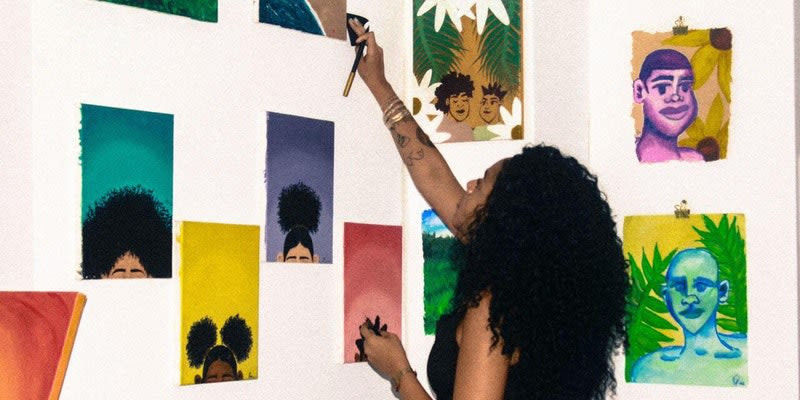Artist Quiara Capellan Inspires Students in S.O.R.T Africana Women’s Art Workshop
Quiara Capellan, a freelance designer, painter, licensed tattoo artist and recent Fordham University graduate, visited Colgate on Friday, Feb. 21 to lead the Sisters of the Round Table (SORT) Africana Women’s Art Workshop at the Center for Women’s Studies. Capellan set a conversational tone as she sat at a large rectangular table with the students in attendance—a set up that enabled a discussion-style, collaborative workshop. After asking all students to introduce themselves, Capellan spoke to her artistic and personal backgrounds, which she says go hand-in-hand.
“I have been making art since I was a kid. I often tie back events in my life to my art—I recycle life phases,” Capellan said.
She addressed the adversities she faces working as a freelance artist while being a woman of color in a white male-dominated industry—in specific reference to the tattooing industry of New York City. Capellan spoke with an admirable candor that sparked conversation on the topic of art as a mode of healing and personal growth.
“Tattooing is healing for me because I get to meet people and just talk. As a woman of color living in New York City, I often feel silenced. I never censor myself so it’s nice to communicate with others and share stories. Tattooing forces me to switch up what I’m doing and get out of my comfort zone,” Capellan said.
Since she feels that interacting with others is central to her growth as an artist, Capellan centers herself around people who inspire her. She chooses to tattoo people who may be refused as clients by other artists because of their race, gender, sexuality or weight for example. Although rewarding, tattooing marginalized individuals can be emotionally taxing at times according to Capellan.
“There is always that weight on me being a tattooer of color to provide a safe space for women, people of color and queer individuals,” Capellan said.
Capellan expanded on this statement, saying that getting a tattoo can be an experience that increases one’s self confidence, but it can also be emotionally scarring if one is not treated properly by their tattoo artist. As a result, she puts immense pressure on herself to make sure that her customers’ experiences are positive and empowering ones. As she continued, Capellan shared how tattooing and art in general are not only healing for her, but how they allow her to truly indulge her passion.
“When you’re living your truth, nothing else matters. Figure out what you like to do and take it to the extreme. If you love something, why aren’t you doing it? You can tell when someone loves something because they have that glow in their eyes while they do it,” Capellan said.
For her, diving head-first into the New York art scene not only enabled Capellan to have that “glow in her eyes” on a daily basis, but it allowed her art to evolve. She compares this artistic growth to the way human taste buds change, saying that as she goes through life her art will never be the same. For instance, Capellan says that she could draw for 24 hours, seven days a week and she would never draw the same sketch twice.
To give the students first-hand experience with art’s transformative and healing powers, Capellan finished the workshop with a drawing activity. Though only two students of the 15 in the room identified themselves as artists, Capellan encouraged all to tap into their creative side and draw the first thing that came to mind when she said a color. As students drew to the best of their abilities and explained the thought process behind their drawings for three rounds of activity, students remarked that this exercise helped clear their minds and focus on the task at hand rather than the stresses that are a part of student life. According to Capellan, art-based exercises like these are creative ways to check in with yourself.
“You are your one true love. It is not easy to show up for yourself everyday, but it’s important to check in with yourself constantly,” said Capellan. As her workshop finished, students not only left feeling inspired to pursue their passions, but to do so in a way that can also be healing.

Sophia Zanussi is a senior from Evanston, IL concentrating in English literature and minoring in Middle Eastern and Islamic studies. She has previously...









